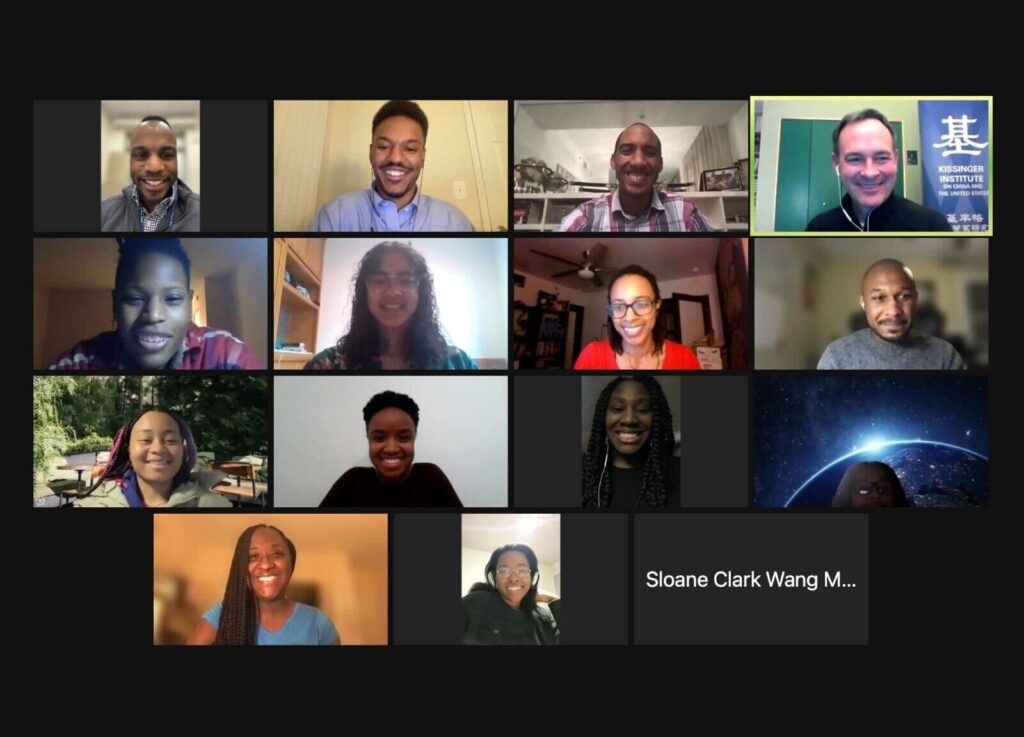
Introduction:
NABEA’s Chinese Language Group (CLG) is a community-driven program founded and led by Leland Lazarus and Amani Core. This was the first members’-only language group, created in February of 2021, just 2 years after NABEA’s founding in 2019. As part of NABEA’s mission to uplift Black voices in the U.S.-Asia space, the interview below highlights the grassroots efforts of these incredibly talented community leaders.

Q: What led you to start the CLG?
Leland: Since joining NABEA a few years ago, we’ve met so many awesome Black China professionals! But we kept hearing that, due to the pandemic and the deteriorating U.S.-China relationship, many Americans – including Black Americans – who lived, worked, or studied in China needed to return home. We created the CLG to provide a space where these Black China professionals could both maintain and improve their Chinese while in the United States; we believe maintaining language fluency is important in successfully fostering U.S.-China relations, especially during this uncertain time.
Amani: Given my experience teaching Chinese stateside, Leland initially approached me about starting the CLG. After our first call outlining our vision for the group, this felt like something we could really pull off! Naturally, I enjoy providing a space for us to discuss unique topics in Chinese, but it’s the community of Black Americans engaging with each other that energizes me. Chinese language practice is the medium, but the sense of community is an important and meaningful byproduct.
Q: In leading and shaping the CLG, what has been most surprising? Most enjoyable?
Leland: What surprised us the most is, more than a year and a half later, we’ve grown to 64 members on our Slack Channel! So far we’ve explored a myriad of topics in our biweekly lessons, such as racial identity, climate change, social media and technology, ethnic minority rights, cross-strait issues, and China’s “lying flat” movement, among others. To guide our one-hour discussions, we design lesson plans tailored to each topic, which includes building a vocabulary list and gathering relevant sources for the group.
The most enjoyable part about the group is learning from our members. We’ve had internal NABEA members lead incredible sessions, and we’ve also invited external native Chinese instructors and experts to lead guest lectures. And there have been lots of laughs along the way! We are proud to witness our community grow in both numbers and impact, but we are dedicated to building on this progress.

Amani: I’d have to agree with Leland here. The current size of the group is really exciting to see! Morseso, the varied member engagement — whether that be leading sessions or seeking resources — shows that everyone is committed in a way that best serves their wants and needs. I think this fact reflects our different language levels and backgrounds, and we can move in a way that helps everyone both reach their goals and meet their expectations.
As for the most enjoyable part of the group, it’s refreshing to see new faces in our sessions! Admittedly, it can be intimidating to speak Chinese with a group of people you just met, so I think it’s always courageous to just put yourself out there and go for it.
Q: Is there a topical discussion that was most memorable to you?
Leland: Oh, do you really have to force us to choose?! We’ve had so many great sessions so far, but I’d say some of our most memorable ones included a conversation with Director of the Wilson Center’s Kissinger Institute on China and the United States, Robert Daly about the future of the U.S.-China relations and a discussion with BBC Investigative Journalist Runako Celina about her groundbreak documentary “Racism for Sale” on the video-making industry in China.
Amani: There are so many great sessions to choose from! I’ve enjoyed all of them, but one of the more memorable sessions was the first time we brought in a Brown University Chinese professor, Wang Yang, to speak with the group. As non-native Chinese speakers, collaborating with speakers who are from China helps us stay more authentic to Chinese culture, providing the group with a strong foundation. But more lightheartedly, it felt like we were all in class again! Chinese teachers really know how to command a room with their enthusiasm, and it was a great reminder of what it feels like to be a student.
Q: Any final thoughts?
It’s great to see that a NABEA Japanese Language Group has also come together recently. We can’t wait to see a Korean group, Cantonese group, or even a Southeast Asian language group sprout up soon! We’re always looking to recruit more internal members and external guest speakers as well as come up with more interesting topics, so if you’re interested, feel free to reach out to us!
The Chinese Language Group is a program organized within the NABEA Slack community. If you are interested in joining, sign up to join NABEA’s Slack workspace here and join the #chinese-conversation-group channel.